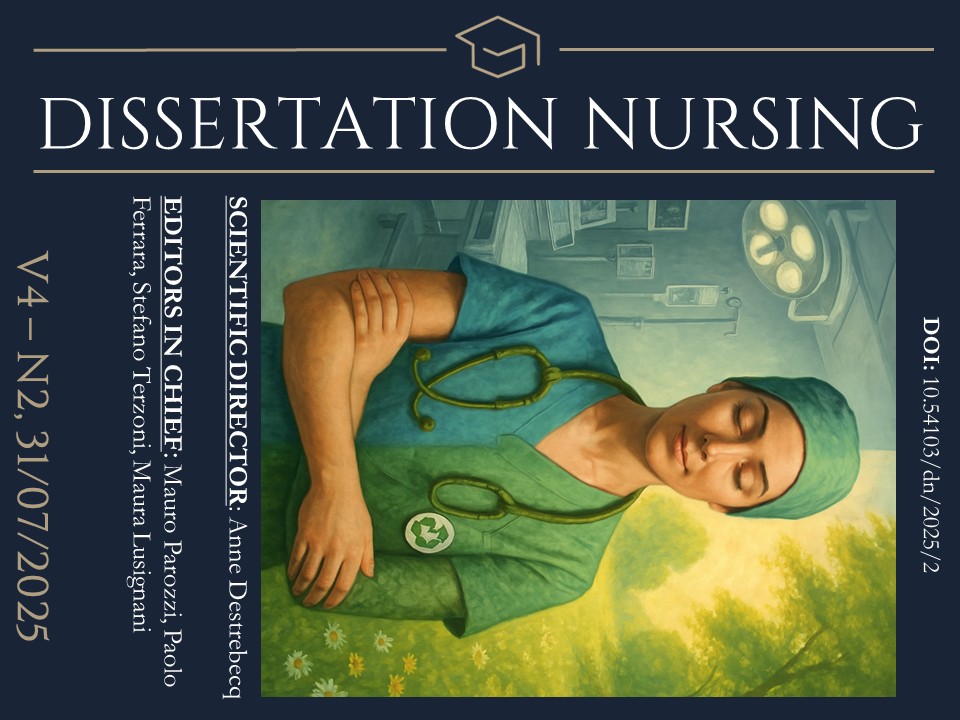Studio pilota di traduzione in italiano e validazione culturale di uno strumento per valutare il debriefing: il Debriefing Assessment for Simulation in Healthcare (DASH)
DOI:
https://doi.org/10.54103/dn/27575Parole chiave:
Simulazione, Debriefing, Valutazione, DASH, TraduzioneAbstract
BACKGROUND:
Il debriefing rappresenta una componente essenziale del processo di apprendimento esperienziale; pertanto, è fondamentale disporre di strumenti condivisi per valutarne la qualità e fornire un feedback strutturato agli istruttori. Il Debriefing Assessment for Simulation in Healthcare (DASH) è uno strumento progettato per supportare lo sviluppo e la valutazione delle competenze di debriefing.
OBIETTIVO:
Tradurre in italiano e adattare culturalmente gli strumenti Debriefing Assessment for Simulation in Healthcare (DASH).
MATERIALI E METODI:
È stata effettuata la traduzione diretta, la revisione e la retrotraduzione di tutte le schede di valutazione e del Rater’s Handbook – Manuale del DASH. La retrotraduzione è stata esaminata dagli autori originali del DASH e discussa con i traduttori per produrre una traduzione armonizzata approvata.
RISULTATI:
Le schede di punteggio DASH e il Manuale sono stati sottoposti a tre round di revisioni iterative tra i traduttori e il revisore, che si sono incontrati online per raggiungere un linguaggio comune e replicarlo su tutte le schede di punteggio e sul Manuale. Sono state riscontrate un totale di 9 discrepanze tra la retrotraduzione e la versione originale degli strumenti, tutte affrontate dagli autori della versione italiana. Nella retrotraduzione del Manuale non è stata rilevata alcuna discrepanza.
CONCLUSIONI:
Si auspica che l'applicazione del DASH nei contesti appropriati consenta di ottenere risultati positivi, offrendo feedback oggettivi ai debriefer e contribuendo così a migliorare la qualità dei debriefing condotti, con ricadute potenzialmente positive sull'efficacia dei risultati di apprendimento. Ricerche future saranno necessarie per valutare la stabilità nel tempo, la robustezza e l'affidabilità dello strumento nella sua versione italiana.
Downloads
Riferimenti bibliografici
1. Kolb D. Experiential Learning: Experience As The Source Of Learning And Development. Vol. 1, Journal of Business Ethics. 1984.
2. Rudolph JW, Simon R, Dufresne RL, Raemer DB. There’s No Such Thing as “Nonjudgmental” Debriefing: A Theory and Method for Debriefing with Good Judgment. Simul Healthc. 2006;1(1).
3. Schon D. The Reflective Practitioner: How Professionals Think In Action. Basic Books; 1984. 384 p.
4. Fanning RM, Gaba DM. The Role of Debriefing in Simulation-Based Learning. Simul Healthc J Soc Simul Healthc. 2007;2(2):115–25.
5. Rudolph JW, Simon R, Raemer DB, Eppich WJ. Debriefing as Formative Assessment: Closing Performance Gaps in Medical Education. Acad Emerg Med. novembre 2008;15(11):1010–6.
6. Alhaj Ali A, Musallam E. Debriefing Quality Evaluation in Nursing Simulation-Based Education: An Integrative Review. Clin Simul Nurs. marzo 2018;16:15–24.
7. Cook DA, Hatala R, Brydges R, Zendejas B, Szostek JH, Wang AT, et al. Technology-Enhanced Simulation for Health Professions Education.
8. Draycott TJ, Crofts JF, Ash JP, Wilson LV, Yard E, Sibanda T, et al. Improving Neonatal Outcome Through Practical Shoulder Dystocia Training. 2008;112(1).
9. Savoldelli GL, Naik VN, Park J, Joo HS, Chow R, Hamstra SJ. Value of Debriefing during Simulated Crisis Management. Anesthesiology. 1 agosto 2006;105(2):279–85.
10. Endacott R, Gale T, O’Connor A, Dix S. Frameworks and quality measures used for debriefing in team-based simulation: a systematic review. BMJ Simul Technol Enhanc Learn. aprile 2019;5(2):61–72.
11. Dismukes RK, McDonnell LK, Jobe KK. Facilitating LOFT Debriefings: Instructor Techniques and Crew Participation. Int J Aviat Psychol. gennaio 2000;10(1):35–57.
12. Edmondson A. Psychological Safety and Learning Behavior in Work Teams. Adm Sci Q. giugno 1999;44(2):350–83.
13. Brett-Fleegler M, Rudolph J, Eppich W, Monuteaux M, Fleegler E, Cheng A, et al. Debriefing Assessment for Simulation in Healthcare: Development and Psychometric Properties. Simul Healthc J Soc Simul Healthc. ottobre 2012;7(5):288–94.
14. Casimir R, Linn L, King H, McKenzie D, Thompson M, Perry RL. Simulation models: another approach to teaching and learning. J Am Vet Med Assoc. 15 dicembre 2022;261(1):47.
15. Fegran L, Ten Ham-Baloyi W, Fossum M, Hovland OJ, Naidoo JR, van Rooyen DRM, et al. Simulation debriefing as part of simulation for clinical teaching and learning in nursing education: A scoping review. Nurs Open. marzo 2023;10(3):1217–33.
16. Wild D, Grove A, Martin M, Eremenco S, McElroy S, Verjee-Lorenz A, et al. Principles of Good Practice for the Translation and Cultural Adaptation Process for Patient-Reported Outcomes (PRO) Measures: Report of the ISPOR Task Force for Translation and Cultural Adaptation. Value Health. marzo 2005;8(2):94–104.
17. Sousa VD, Rojjanasrirat W. Translation, adaptation and validation of instruments or scales for use in cross‐cultural health care research: a clear and user‐friendly guideline. J Eval Clin Pract. aprile 2011;17(2):268–74.
18. Lederman LC. Debriefing: Toward a Systematic Assessment of Theory and Practice. Simul Gaming. 1 giugno 1992;23(2):145–60.
19. Piault E, Doshi S, Brandt BA, Angün Ç, Evans CJ, Bergqvist A, et al. Linguistic validation of translation of the Self-Assessment Goal Achievement (SAGA) questionnaire from English. Health Qual Life Outcomes. 23 aprile 2012;10:40.
20. Muller-Botti S, Maestre JM, Del Moral I, Fey M, Simon R. Linguistic Validation of the Debriefing Assessment for Simulation in Healthcare in Spanish and Cultural Validation for 8 Spanish Speaking Countries. Simul Healthc J Soc Simul Healthc. 1 febbraio 2021;16(1):13–9.
21. Couto TB, Matos FM, de Toledo Rodovalho PD, Fey M, Simon R, Muller-Botti S. Translation of the Debriefing Assessment for Simulation in Healthcare in Portuguese and cross-cultural adaptation for Portugal and Brazil. Adv Simul Lond Engl. 7 luglio 2021;6(1):25.
22. World Health Organization - WHO. Process of translation and adaptation of instruments [Internet]. Disponibile su: https://iris.who.int/bitstream/handle/10665/366278/WHO-MSD-GSEDpackage-v1.0-2023.9-eng.pdf
23. Behr Dorothée. Assessing the use of back translation: the shortcomings of back translation as a quality testing method. 2017;573–84.
24. Sousa VD, Rojjanasrirat W. Translation, adaptation and validation of instruments or scales for use in cross-cultural health care research: a clear and user-friendly guideline. J Eval Clin Pract. aprile 2011;17(2):268–74.
25. Maneesriwongul W, Dixon JK. Instrument translation process: a methods review. J Adv Nurs. ottobre 2004;48(2):175–86.
26. Guerrero JG, Tungpalan-Castro GM, Pingue-Raguini M. Impact of simulation debriefing structure on knowledge and skill acquisition for postgraduate critical care nursing students: three-phase vs. multiphase. BMC Nurs. 22 novembre 2022;21(1):318.
27. Kuszajewski ML. Nursing Simulation Debriefing: Useful Tools. Nurs Clin North Am. settembre 2021;56(3):441–8.
28. Arora S, Ahmed M, Paige J, Nestel D, Runnacles J, Hull L, et al. Objective structured assessment of debriefing: bringing science to the art of debriefing in surgery. Ann Surg. dicembre 2012;256(6):982–8.
29. Xie YD, Li XY, Liu Q, Huang R, Li T, Fang YX, et al. Cross-cultural validation and psychometric testing of the Debriefing Experience Scale (DES): a cross-sectional study. BMC Med Educ. 13 aprile 2022;22(1):272.
30. Fey MK, Roussin CJ, Rudolph JW, Morse KJ, Palaganas JC, Szyld D. Teaching, coaching, or debriefing With Good Judgment: a roadmap for implementing «With Good Judgment» across the SimZones. Adv Simul Lond Engl. 26 novembre 2022;7(1):39.
Dowloads
Pubblicato
Come citare
Fascicolo
Sezione
Licenza
Copyright (c) 2025 Sonia Lomuscio, Pierluigi Ingrassia, Andrea Mastroieni, Mauro Parozzi, Michela Bernardini, Greta Ghizzardi

Questo lavoro è fornito con la licenza Creative Commons Attribuzione - Non commerciale - Non opere derivate 4.0 Internazionale.
Accettato 2025-01-21
Pubblicato 2025-07-31

















